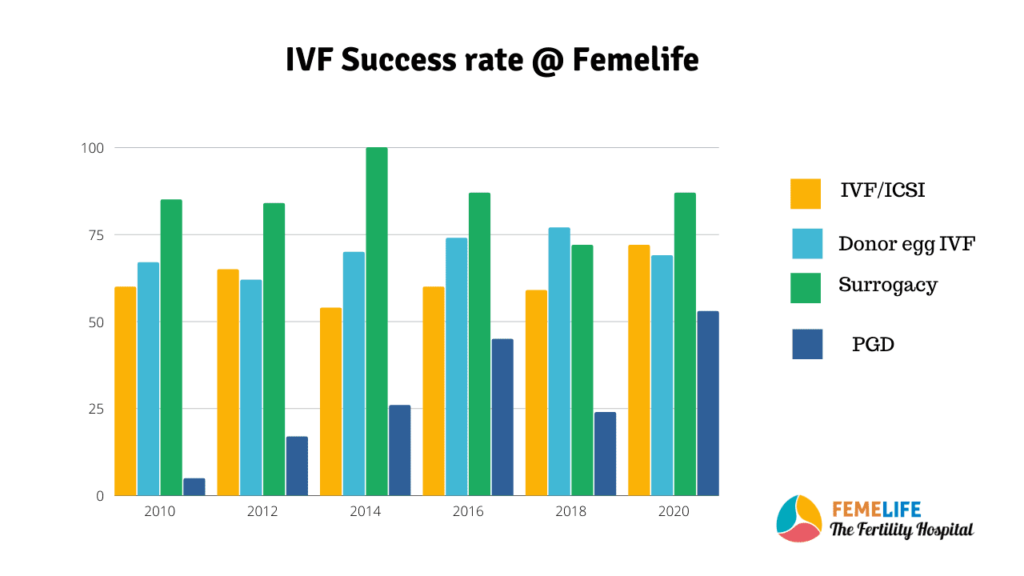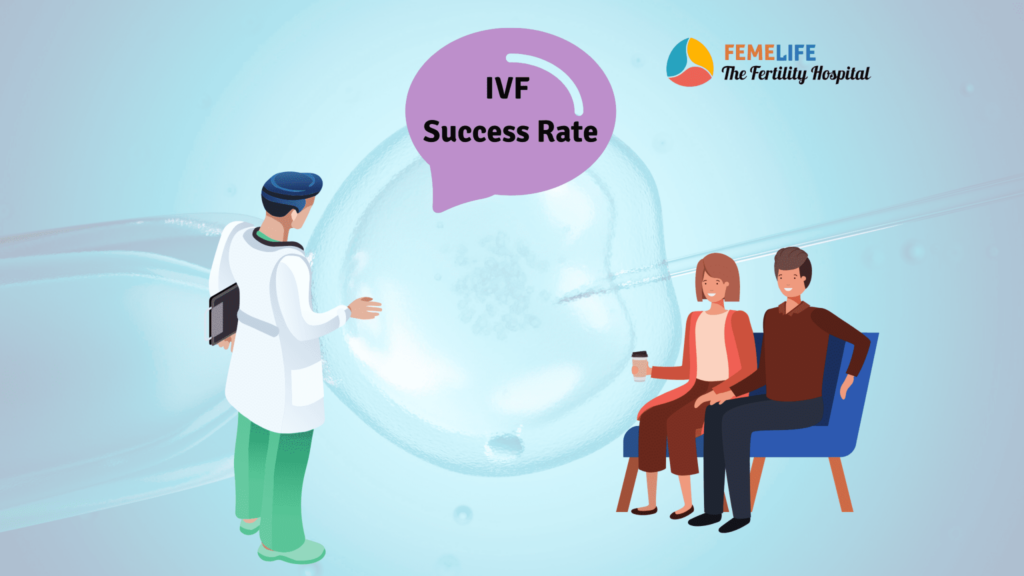Forty years back when IVF treatment gave its first success couples suffering from infertility were positive with a ray of hope. Birth of Louise Joy Brown was a turning point not only for infertility but also for the entire field of health and genetics. Preimplantation genetic diagnosis and regenerative medicine go side by side. Larger ongoing research field includes cloning and genetic designing. The advent of ICSI was a major milestone in this aspect when the human egg was artificially fertilized with sperm by a manipulator. But contrary to the expectation the developments could not continue in the field of embryo culture and uterine implantation. However, we have reached a point where human embryo transfer gives the maximum IVF success rate up to 50 to 60% in many adverse situations. Infertility treatment still has many challenges in terms of low success and implantation failure.
What are the chances of getting pregnant with IVF treatment?
IVF success rate has many determinants and contributing factors. Many of these factors are limited by the natural process of human fertilization science. Even for healthy couples, the success of natural conception is below 15% in a cycle. Fertility in humans is very much lower than other animals. Advanced technology has enabled us to achieve a higher IVF success rate in a laboratory. A wide variation in success rates of IVF clinics suggests a lack of a programmed protocol. A good IVF program and experienced team following high-quality laboratory protocols can achieve an IVF success rate of around 50%.

What is the IVF success rate on the first try?
Top IVF centers in India like Femelife Fertility have achieved a high success rate in the first try. Usually, patients undergoing the first IVF cycle face more psychological consequences if the cycle fails. It is important to counsel such couples before the start of the cycle. The first IVF cycle gives the success of around 50 to 60% to young couples. With complications like endometriosis, thin endometrium lining, or poor sperm quality the IVF success rate may be low. If you are undergoing IVF discuss with your doctor regarding the risk factors. Take vitamins, exercise to reduce weight, and follow a healthy lifestyle 2 to 3 months prior to the cycle. Around 400,000 babies are born every year from 1.6 million IVF cycles worldwide, so take your chance!
What is the best age for IVF?
During the last two decades, life has been racing and many are victims of it. Changes in lifestyle in different societies have forced couples to postpone marriages and delay pregnancy. After you cross the third decade of life your fertility efficiency starts declining. The need for assisted reproductive techniques is more in couples planning pregnancy after 35 years. Subsequently, the cost of infertility treatment starts increasing with lower chances of achieving pregnancy. The best chances are when you are young before 30 years.
Is IVF 100 percent successful?
You must accept this as a take-home message that no treatment of IVF is 100% successful even in the best laboratory in the world. IVF success rate is limited by many factors. The live birth rate per cycle is the main outcome of IVF treatment. Factors like the age group of the women concerned, duration of infertility, previous fertility, and the number of failed IVF treatments are among the major determinants of the IVF success rate. Employing some of the advanced techniques such as ICSI, extended embryo culture and embryo selection can improve the IVF success rate marginally. But in no way, IVF can be made 100% successful. If you are lucky enough to get IVF success in the first try, your success is 100%!
How can I increase my IVF success rate?
As we have discussed IVF success rate is decided by many factors. Among these qualities of eggs and sperm play a major role. To improve the quality of gametes your doctor will advise you to follow a healthy lifestyle. You must quit smoking if you are serious enough to take a step forward. Reducing alcohol will help you through the pregnancy and well being of the baby. Avoiding long travel and exposure to heat for a long time is good for sperm health.
Supplements can help you
Take enough antioxidants and vitamins to improve egg and sperm quality. A moderate-protein diet with fewer carbohydrates helps you lose weight and balance your hormones. Keep yourself hydrated with enough water; this removes toxic material from your body.
| Select a good IVF Clinic | The IVF clinic should have all advanced facility like blastocyst culture, embryo freezing, assisted hatching & experienced team. |
| Quit smoking, alcohol | You must quit smoking and reduce alcohol to help you go through the pregnancy and for well being of the baby. |
| Take healthy diet | Diet rich in protein with fewer carbohydrates helps you lose weight. Take enough water to remove toxins from body. |
| Shed extra weight | Balanced diet and regular exercise can help you reduce weight. This is essential to keep hormones under control. |
| Give time for discussion | Discuss every asspect of your treatment with specialist like quality of egg & sperm, protocol of IVF and embryo transfer. |
| Avoid long travel | Long travel is not good for sperm. Avoid heat exposure and get enough sleep by skipping long journeys. |
| Add supplements | Take enough antioxidants and vitamins to improve egg and sperm quality. |
| Emotional preparations | Talk to friends of their experience in IVF, take help of relatives to support you in need. |
Why does IVF fail the first time?
The first IVF cycle may teach us many lessons. Your eggs are seen first time under a microscope and this can reveal the cause of infertility. Women with PCOD and endometriosis might have got an idea about the quality of eggs beforehand. But other couples may get a shock about the egg quality for the first time. The first IVF cycle also tells us about your suitability to IVF protocol, endometrial receptivity, and fertilization efficiency of your egg with your partner’s sperm. Failure in the first IVF cycle doesn’t mean the end of the world. With the knowledge gained your specialist will prepare you in a better way next time. Your first IVF cycle may fail for no reason at all, and this shouldn’t prevent you from future treatment.
Does IVF usually work the first time?
Many couples are lucky enough to get success for the first time. Usually, a young couple undergoing an IVF cycle for the tubal block can gain maximum. These groups of patients have good quality eggs and sperm which are prevented from meeting due to the fallopian tube blockage. Others having problems with eggs and sperm can also get IVF success for the first time if they have good embryos. IVF success rate is decided by many factors and surprises as well. Don’t get disheartened if your IVF doesn’t work in the first go. You may have to wait for another cycle.
How many eggs improve IVF success rate? Are 6 eggs good enough?
Couples start predicting their IVF success depending on the ongoing treatment. Definitely the number of eggs is one of the deciding factors but it isn’t enough. A good number of eggs permits to go ahead with an extended embryo culture till blastocyst. If you have more eggs you may have more embryos for freezing. This saves your cost and pain as you don’t have to undergo IVF injections again if your cycle fails. But too many eggs can reduce your chances by ovarian hyperstimulation. It can endanger your life and also may yield poor quality oocyte. On average normal responding women develop 6 to 10 eggs in both ovaries together. This is considered enough for an IVF cycle and increases IVF success rate.
How many failed IVF before success?
As IVF is a costly affair many couples limit treatment after one or two failed cycles. IVF treatment is a lengthy process and trying until success may be too tiresome. We can’t predict which cycle gives you success but with repeated trying, many couple have fulfilled their dreams of parenting. If finance is not a problem you can go ahead with repeated cycles. Usually, couples achieve success with a 2- 3 cycle. If not, you may have to look for alternatives like oocyte/sperm donation or surrogacy.
How long after a failed IVF cycle Can I try again?
IVF cycle uses many hormone injections which alters the balance in your body. You may gain weight or have delayed and heavy cycles after a failed IVF. Fertility specialists often suggest taking a break for 2-4 months to bring your body into shape. You may take this time to build confidence for the next IVF cycle. Try having a good exercise regimen and follow a healthy diet during this period. Immediate back to back treatment can be tried if you have a constraint in time.
Why does IVF fail with good embryos?
IVF success rate is decided by many factors apart from good embryos. Even though the embryos appear good may be having chromosome problems inside. Apart from embryo quality IVF success rate is dependent on the uterine lining. Implantation of embryo is decided by the endometrial lining as well. At times after implantation, the IVF cycle goes for a chemical pregnancy. Ectopic pregnancy also is an outcome of the IVF treatment cycle. Other factors like luteal support medicines, infections, and adverse body conditions also can cause IVF failure.
Is the IVF success rate more in the 2nd cycle?
None of your IVF cycles can be predicted and guarantee you sure success. You may fail in the first and succeed in the second for no obvious reason. It is not right to assume that your second cycle will be more successful. However certain protocols may change from the lessons of the first cycle.
How many rounds of IVF is average?
Women usually conceive within 2 to 3 attempts at IVF centers following good protocols. Best IVF centers have seen success in many women and have evolved through the process of IVF. The number of cycles of IVF may get extended in difficult cases but repeated trying definitely improves tour IVF success rate cumulatively.

